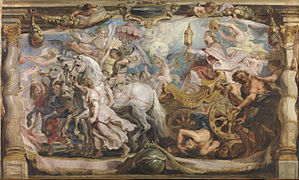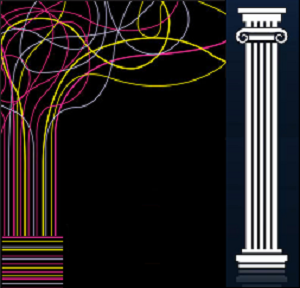
Arquivo para a ‘Antropotécnica’ Categoria
The return to the nations and the absence of the Whole
In a time of hypercommunication, social media makes one feel the absence of the Whole, which Peter Sloterdijk calls the Big: “the form of the big in the industrial world insists on the well-known megalopathic stress in expanded dimensions – but then the people on the street must worry, who previously would have supported a Minister of Foreign Affairs” (Sloterdijk, 1999, p. 61), what he did not imagine was that this would have the opposite reaction: the return of patriotism.
makes one feel the absence of the Whole, which Peter Sloterdijk calls the Big: “the form of the big in the industrial world insists on the well-known megalopathic stress in expanded dimensions – but then the people on the street must worry, who previously would have supported a Minister of Foreign Affairs” (Sloterdijk, 1999, p. 61), what he did not imagine was that this would have the opposite reaction: the return of patriotism.
However, only unexpected forces realized this effect, while today’s society: “suffering bouts of nausea in the face of its political class, at the moment cannot do more than grant a pause for reflection on fundamental questions” (p. 62).
The author notices the lack of “something”, the emphasis is his, but prefers to “interpret it as the spirit of the agrarian age” and the great empires (pg. 60), and in his agnostic vision, “for her came the critical moment with the “death of God” “ (idem), again the emphasis is on the author.
Thus in the absence of an eschatological figure, in a world that rejects the idea of the sacred, the divine and a human-divine God of Christians, “the form of the Great is changed, filiation pathologies of all kinds become epidemic” (pg . 66), not only in politics, but also in religion, everyone believes they have found a “great one” and heretically places him in the place of God, even in religions an imaginary god of wealth, leisure and even lust, however contradictory it may be. as it may seem.
The book from the end of the last millennium, understands the problem right but in the wrong place, under the theme of “conservative revolution” (a new highlight from the author) it is experienced “two or three generations ago in the Catholic resistance movements in central Europe and the south, probably a great intercultural career ahead – under a religious, culturalist, regionalist banner” (pg. 67).
Returns to a correct analysis: “in the Great modern – the quasi-religious state-national identities that since the 19th century have marked political forms of life in Europe and later throughout the world” (idem), remember Nazism and now in several forms of “national” wars.
The modern phenomenon of this Great One, of the great homeland whether in Israel or Russia, in China or the USA, is nothing other than the absence of a Great Greater, the divine one that leads men to break borders, to live with what is different and to understand the need for a new civilization that sees the planet as a Homeland.
For the great religious man, one may ask where God is, but the divine-historical figure of Jesus and his beyond-Abrahamic vision that surpasses that of these conflicting peoples, proclaimed a universal motto: “Whoever has seen Me has seen Him who sent Me ” (John 12:45).
The political animal and the ontological being
We imagine from most narratives that Greek politics is
a great model for contemporary society, but Sloterdijk’s correction is as accurate as possible: “The truth about the form of the world imagined by Plato and Aristotle is certainly that city and empire they are figures of the agrarian era” (Sloterdijk, 1999, p. 43).
It is difficult to believe, however, “if Plato defined political knowledge as a pastoral art in reference to featherless bipeds, then it is clear how agro-ontological motives advanced even in the fundamental definition of the essence of power in cities – agriculture and animal husbandry are the reservoirs of contemplation, from which political discourses must draw their plausibility, even if the gaze passes from the garden of the academy to the agora” (pg. 44).
The importance escapes even Sloterdijk, since in modern industrialized European society the “peasant experience” that even Heidegger blames is so, and the “extra-agrarian motives” came “from the workshops of artisans, namely blacksmiths, to advance in the consciousness of the political-philosophical world, and of the ports, a commander, in Greek kybernetes, could become a suggestive figure of power” (page 44).
Coexistence with nature is also resumed in Sloterdijk and his disciple Chul-Han: “it has always been a risk for the city that it uses more than creates man; more than that, it drives him to the last flowerings like reproductions that are too simple; in both the biological and cultural sense, it is more greenhouse than field or garden” (page 45).
Before the development of Chul-Han’s psychopolitics, it can already be found in Sloterdijk: “dominators, politicians and bosses are, according to this logic, above all detonators of functional cruelty – which they obviously do well to create for themselves, under names like reason of state, common good, justice, planning, among others, an acceptable face, if possible sincere” (page 47).
Sloterdijk develops here the true concept of “humanity” “breaks down here into groups that intensify through tensions, and groups that become stagnant in suffering, pain, in the great civilization, acquires a terrible double face; it acts in some as a stimulator, in others as an obstructer; for the minority, lack has an educational effect; for the majority, it acts as a destroyer of souls” (page 48), it is worth clarifying that Sloterdijk is not religious.
To conclude this post, she detects contemporary illness: “the intimate strangeness of master and servant now links them” (page 48) and “the paradox of exclusive inclusivity then takes its toll; people begin to hunt people, kill them in large numbers, exterminate entire hordes and tribes, sell and buy them… “ (page 49).
We have not yet moved far away from Zoom, the exclusivities and non-inclusivities are there.
SLOTERDIJK, Peter. 1999. No mesmo barco: ensaio sobre hiperpolítica (In the same boat: essay on hyperpolitics). Trans. Claudia Cavalcanti. Brazil, São Paulo: Estação Liberdade.
Hyperpolitics and war
When Peter Sloterdijk wrote “All in the same  boat: essay on hyperpolitics” we were on the threshold of the third millennium, Manuel Castells was writing Sociedade em Rede and Edgar Morin was writing about Cabeça Bem done, rethinking reform, reforming thought, they were attempts to wake up and make humanity move towards a less dark future.
boat: essay on hyperpolitics” we were on the threshold of the third millennium, Manuel Castells was writing Sociedade em Rede and Edgar Morin was writing about Cabeça Bem done, rethinking reform, reforming thought, they were attempts to wake up and make humanity move towards a less dark future.
Sloterdijk also wrote “If Europe awakens”, he calls it the Empire of the Center and pays attention to its colonialist past and the need for a new future and rethinks war, a topic so linked in the country that triggered the Second World War.
These are all thoughts that tried to redirect a dark future from the possibility of a new war. In Everyone in the Same Boat, Peter Sloterdijk revisits the political project that was born in classical antiquity, the attempt to organize the State, and says: “How can they “talk” to such large numbers of people and convince them to feel like they are participating in what is “great” – until they reach the willingness to face death in exercises of millions against forces of equal order of magnitude, in order to assure “their own “successors what ideologues call the future” (Sloterdijk, 1999, p. 31).
Contrary to the optimism of Castells and Morin, not only justifiable, but desirable, of a more civilized and humane future, Sloterdijk warns that this connected hypersphere, see that social media were just nascent for these three great thinkers, was for the German, a dangerous future of hyperpolitics.
“The first gestures of this instinctive holism are attempts to describe the cosmos as a larger house and people as larger families” (Slotertijk, p. 32), and adds that in fact, “homo politicus and homo methaphysicus belong together historically; promoters of the State and prospectors of God are evolutionary twins” (Sloterijk, p. 33), of course it is not the view of everyone, much less of men in power, the great statesmen who think in this holism no longer exist and now it is the empire of force and monolithic, authoritarian and hateful thinking.
The Greeks’ political project for him can be called “metallomaniac”, but he warns that this is the man who “meddles in big, bigger issues to have something that he will look at and then abandon. But should they call those who, once they have grasped great things, will never abandon them? I propose megalopaths” (page 34).
Also great empires: the Persian, the Roman, the Mongols who came to dominate half of Europe, the Turkish-Ottoman and more recently Napoleon and the “forgotten” colonies in Africa that were nothing more than an extension of the Central Empire, as Sloterdijk calls it the Europe.
“State Humanism has since been the search for a fair center – and since the Roman reception of this Greek idea, this search has carried its name still known today: Humanity” (pages 35-36).
Sloterdijk questions this model of homo politicus, the “pontifex maximus”, “how do we become raja? How do we become Caesar? How do we become consul, senator, emperor? How must someone live to enter the history books like Metternich, Lord Morlborough or Bismark? (page 37).
The idea of politics as metanoia, this was the initial intention of Paideia for example, is no longer true in war, Sloterdijk quotes Goethe: “the man who does not suffer scourges cannot be educated”.
Arbitrary power and socialization
In his book “In the swarm: a digital perspective” Byung Chul-Han  clarifies that only a relationship is symmetrical (both sides have the same power or the same power) respect, if respect is lacking there is always an arbitrary exercise of power , but let’s look at other definitions.
clarifies that only a relationship is symmetrical (both sides have the same power or the same power) respect, if respect is lacking there is always an arbitrary exercise of power , but let’s look at other definitions.
A widely used one is that of Norberto Bobbio: “… every probability of imposing one’s will in a social relationship, even against resistance, whatever the basis of this probability (Weber, 1994, p.33), there is always the possibility of “manipulation”, use of reward, threat of punishment and other forms of asymmetry that favors force.
Generalizing the different forms of power, and contrary to Foucault (see the previous post), Lebrun says that power and domination go hand in hand, a person has power when the other is deprived of it, he puts them in the same boat: m Marx, Nietzsche, Weber , Raymond Aron, Wright Mills and others.
This conception comes from North American sociology known as “Zero Sum Theory”, a theory that dates back to Hobbes, which defined the power of the “sovereign” or the State, as being “one against all” and “in favor of all at the same time”. time”, but from top to bottom.
Thus, this power is simply applied as an obligation or prohibition to the dominated, passing through them and through them, in the same way, the dominated also use it and rely on it, but the dominated have subjectivity (in the ontological relationship it is dasein), and they produce new knowledge about power relations and also empower themselves. In this sense, it is important to relate power to potency, or capacity for action.
The concept of act and power in Thomas Aquinas is, however, more complete, because it is also related to truth, not temporal, but ontological, present in Being:
“[…]some things may be, although they are not, while others actually are. What can be (illud quod potest esse) is called potential being; what already is (illud quod iam est) is called being in act. However, being is double: the essential or substantial being of the thing, like being a man, is simply being; the other is being accidental, like the man being white; and that is being other.” (AQUINO, T, 1976, p. 39.)
Thus power is seen in another way, which is also matter and being complete, for Aquinas all are basic components of the substance, the notion of being complete is attributed both to the form that signifies the first act, the actuality, that the form possesses by itself and not by a mediator, when this first act is attributed to matter there will be an actuality, that which today is confused with virtuality (the potency or possibility of being), because in this way every being is in potency, in this way everyone can have power in order to realize its full potential.
This means that it is necessary to empower man, society and recover the disempowered, so re-education, resocialization and even those who are socialized are always possible.
Power, if exercised without arbitrariness and with the dimension of everyone, can and should serve the common good, justice and freedom.
AQUINO, T. (1976) De principiis naturae ad fratrem Sylvestrum, [ed. H.F. Dondaine]. Ed. Leon., t.XLIII, Opuscula, vol.IV. Roma [Santa Sabina]: Editori di san Tommaso.
LEBRUN, G.(1999) O que é poder. Brazil, São Paulo: Brasiliense.
WEBER, M. (1994) Economia e Sociedade. Brazil, Brasília – DF: Editora da Universidade de Brasília, 1994.
Power in Foucault and Chul-Han
Michel Foucault broke with the classical conceptions of the term power and defined it as a network of relationships where all individuals are involved, and we understand the network here with the modern sense of network, although it was vague in his time, individuals are both generators and recipients of power. movement of these relationships, however he identifies them as biopower, while Chul-Han identifies them as psychopower, and in a way adds the media to this.
conceptions of the term power and defined it as a network of relationships where all individuals are involved, and we understand the network here with the modern sense of network, although it was vague in his time, individuals are both generators and recipients of power. movement of these relationships, however he identifies them as biopower, while Chul-Han identifies them as psychopower, and in a way adds the media to this.
State ideology, born from Hegel, is the basis of every history of contemporary power, authoritarianism and modern wars were born from a new idea of imperialism and colonialism, in which stronger states control power not only through weapons, but rather through biopower and now psychopower.
Foucault’s biopower, the state is the first level of power (he calls it a sector), the market is the second level, and the third is civil society, the idea of 4th. The power of the press comes from there.
He studied power not to develop a theory about it, but to identify aspects of subjectivity (in ontology it would be the question of Being), that is, subject over other subjects.
This is important to differentiate him from Chul-Han, who starts from the ontological relationships between beings and identifies the action of media and media structures that act on the psychology of power, so his idea of power (What is power) is like a domination technique that stabilizes and reproduces the dominated system through programming and psychological control.
Foucault sees biopower, as in the body as a training machine, since biopolitics, in the middle of the 18th century, was focused on regulatory controls on the population, the idea being that it was the population increase that caused misery and hunger.
Peter Sloterdijk, who supervised Chul-Han’s doctoral thesis on Heidegger, argues that this “training” process failed and thus, the control process develops towards the fourth power, which Chul-Han focuses excessively on the media, forgetting the 4th. power of the press, TV and cinema that had an enormous influence.
He develops pathologies of self-centeredness (narcissism), emotional instability (borderline) as responses to the demands of a society intoxicated with demands for efficiency, appearance and disciplinary coercion, wrote the author):
“The violence of decapitation is inherent to the pre-modern society of sovereignty; its medium is blood. Modern disciplinary society is, to a large extent, a society of negativity, being governed and dominated by disciplinary coercion, that is, by ‘social orthopedics’. Its form of violence is deformation. But neither decapitation nor deformation are capable of describing the postmodern performance society. It is dominated by a violence of positivity, which confuses freedom and coercion. Its pathological manifestation is depression” (Han 2018, pp. 183-184).
HAN, Byung-Chul. (2018) Psicopolítica: o neoliberalismo e as novas técnicas de poder. Brazil, Belo Horizonte: Âyiné.
Eminent danger of war and hope for peace
A drone attack on the Zaporizhzhia plant last week triggered an alert from Russia that promptly denounced the danger and consequences of a nuclear disaster would be dire.
week triggered an alert from Russia that promptly denounced the danger and consequences of a nuclear disaster would be dire.
It was not clear exactly what weapon was used against the nuclear plant (photo), only that they were drones and that one had been detonated on site. The International Atomic Energy Agency (IAEA), which has experts on site, said only that the information was “consistent” with the entity’s observations, that is, a drone had exploded near the Plant.
International analysts still see the conflict as unlikely due to the catastrophic risk due to the possibility of using nuclear weapons, in addition to conventional combat, the use of cyber and hybrid attacks would be put into motion, initially in Eastern Europe, but with the risk of expanding to Europe and other continents.
Even though NATO holds a significant advantage in both geopolitics, Finland and Sweden joined NATO and Hungary, which sought a position of neutrality, is now strengthened with a military technology agreement made with Sweden, which facilitated its entry into NATO.
Russia, however, has military capabilities combined with economic resources and the modernization of its military apparatus, in addition to a support agreement with China and North Korea, so maintaining peace and preventing conflicts must be done through constant dialogue, but Russian diplomacy continues to play hard and says that dialogue with NATO is “zero”.
Both Russian Foreign Minister Sergey Lavrov and Kremlin spokesman Dimitry Peskov make statements that imply that the conflict with NATO is already underway, diplomatic strategy or pure rhetoric, the fact that tension levels are rising .
NATO responds with military exercises and troop movements on the borders, in January an exercise involved 90 thousand soldiers, new training was announced by NATO commanding general, Christopher Cavoli, the operation called Defensor Firme 24 (Steadfast Defender 24) had already been carried out in other years, but now it takes place amid an intensification of bombings against Kiev.
The hope is that the balance is fragile and both sides know this, and the risk of war would be catastrophic, even though analysts avoid saying that there would be limits on actions.
The light and the truth
There is a single and true light, although we know that light can unfold into various colors that we see from red to violent, and that we do not see as infrared and ultraviolet.
know that light can unfold into various colors that we see from red to violent, and that we do not see as infrared and ultraviolet.
We are increasingly getting closer to the idea that the beginning of the universe had something like light, today according to Standard Physics Theory, the photon was already theorized by Einstein as particles or small “packages” that transport the energy contained in electromagnetic radiation, photons at rest they have zero mass.
Thus, the light that emanates from the origin of the Universe, although not confused with its intention (to radiate light), is at the origin of all electromagnetic radiation from the Big Bang.
The Neoplatonists, like Plotinus (205 – 270), believed in monism and in this radiation of light, there is a one or a god (it was not the Christian God) from which emanates a divine source that radiates throughout all creation, in this one light that Augustine of Hippo will rely on denying the Manichaean dualism that he had previously believed in and from there his turn towards Christianity will take place.
Plotinus’ texts were compiled by his disciple Porphyry and written in the work the Six Enneads (actually nine parts, as ennea in Greek is 9), in which the question of the union of the soul and the intellect stands out, it is based on this idea that the Truth dwells in man.
Thus the soul of the world proceeds from a creative power (not from power, as it does not define it), contemplating the Nous and multiplying itself in all the particular beings of the sensible world, without dividing itself (this is the interpretation of Fritz- Peter Hager in his 1962 book).
The truth thus dwells in the soul and interior of each man, it is this interiority that some critics define as the idealism or intimacy of the Neoplatonists, but today there are several works on the issue of the Contemplative Vitta, Hannah Arendt and Byung Chul Han remember it, but other authors have already started to mention Barthes’ Rumor of the Language mentioned in the previous post.
For Christians, this manifestation of truth occurs ontologically in the Incarnation, Passion and death of Jesus, death because it is part of human life and should be lived as an “Easter” passage that opens eternal life to men, without this passage life fullness is not realized and we perish as matter, this aspect is also problematized by Plotinus.
In the photo, Peter Paul Rubens’ work on Saint Augustine’s Anti-Milleranism, which did not accept the literal reading of Revelation 20:1-10.
Plotinus, Enéadas, (2021) transl. by José Seabra Filho and Juvino Alves Maia Junior, Brazil: Editora Nova Acropole (volume 6 was published this year, completing the work).
Augustine, Saint. (1999). A cidade de Deus (The city of God), trans. Oscar Paes Leme. Brazil, Petrópolis, Editora Vozes.
Truth and good works
There is no ontological truth where the unveiling of being does not occur, and this depends on its deeper realization in contact with its essence and must bear fruit for life, for personal and social well-being and for those who believe for an eternity.
of being does not occur, and this depends on its deeper realization in contact with its essence and must bear fruit for life, for personal and social well-being and for those who believe for an eternity.
Sophists in ancient times created truths that could even be logical, but the objective was to gain power and benefit from those who had wealth and influence, and this has not been eliminated from everyday life until today, a large part of politics is the negotiation of public goods, fraud and for this they use non-truth, and this is not the monopoly of one group.
There is no way to maintain this logic without authoritarianism, the restriction of freedom and silencing the voices of those who suffer from greed for power and wealth, a large part of the current crisis comes from these values, even if they blame the media, they are also under control of these powers.
The media follow the ontic logic in the ontological difference, we briefly develop this issue of the way Heidegger and other followers of the different ontological currents see it, in the scope of interpretation and dialogue the logic cannot be ontic, it must follow the ontological truth that follows from fusion of horizons in the hermeneutic circle (see previous post).
Dualism and polarization follow the ontic truth, blaming the media that do nothing that they do not have under control in some way, which could even be algorithms, man himself, thus the dual ontic logic used is instrumental and in a certain way sophistical because it aims the power.
On Sunday, Holy Week begins for Christians, the ontological truth that was manifested as being in the person of Jesus had to be destroyed by the discourse of power, even the religious power of the time that could not believe that truth is the logic of Being and man, when he manifested his good works, almost always confronted power.
It is necessary to go against the current to reverse the logic of ease, of easy money through corruption, of power for power’s sake and of disservice to society.
Ontological difference and hermeneutic circle
Before the concept developed by Hans George Gadamer, dialogue in Heidegger’s hermeneutic circle seemed to be built on idealist foundations, although it was not exactly this, as knowledge in hermeneutics does not occur through the revelation of the object to the subject, as was seen by Kant, nor is it a mere projection of the object onto the object, it is in fact an “appearance” in dogmatic basis.
George Gadamer, dialogue in Heidegger’s hermeneutic circle seemed to be built on idealist foundations, although it was not exactly this, as knowledge in hermeneutics does not occur through the revelation of the object to the subject, as was seen by Kant, nor is it a mere projection of the object onto the object, it is in fact an “appearance” in dogmatic basis.
Subject and object have their own horizons, the ontological difference explains them, although both are endowed with historicity, the ontic reality as explained in previous posts has a logical truth, in it there is a critique and overcoming of Husserl’s subjectivist (objectivist) phenomenology of transcendental, so idealism has already been overcome there.
Thus, Heidegger’s fundamental ontology gained prominence in the question of the meaning of being is posed as a privileged question, so the being of beings does not “is” in itself another being (Heidegger, 2002, p. 32), like Dasein ( being-there, pre-sentence) is the privileged being that understands being and has access to beings, it is part and essential condition of the human being.
Said by Heidegger: “this being that each of us is and that, among others, has in its being the possibility of questioning, we designate it with the term pre-sense.” (Heidegger, 2002, p. 33), but it is not subjective in the sense of being (entity), this Subject and object have their own horizons, the ontological difference explains them, although both are endowed with historicity, the ontic reality as explained in previous posts has a logical truth, in it there is a critique and overcoming of Husserl’s subjectivist (objectivist) phenomenology of transcendental, so idealism has already been overcome there.
Thus, Heidegger’s fundamental ontology gained prominence in the question of the meaning of being is posed as a privileged question, so the being of beings does not “is” in itself another being (Heidegger, 2002, p. 32), like Dasein ( being-there, pre-sentence) is the privileged being that understands being and has access to beings, it is part and essential condition of the human being.
Said by Heidegger: “this being that each of us is and that, among others, has in its being the possibility of questioning, we designate it with the term pre-sense.” (Heidegger, 2002, p. 33), but it is not subjective in the sense of being (entity), this The opening of being-there, that is, the being of this being-there is concern (cure, sorge), it is a light that gives clarity to presence, that is, that which makes it “open” and also “clear” For yourself.
It is the cure that founds every opening of the pre-sentence and the temporality that originally illuminates it. Heidegger states that only starting from the rooting of the pre-sentence in temporality is it possible to penetrate the existential possibility of the phenomenon, being-in-the-world, which, in the beginning from the analysis of presence, it became known as a fundamental constitution (HEIDEGGER, 2002, p. 150).
Gadamer, Hans-Georg. (2002) Truth and Method II: Complements and Index. Translated by Enio Paulo Giachini. Brazil, Petrópolis, 2002.
Heidegger, Martin. (2002) Being and Time: Part I, Translated by Marcia Sá Cavalcante Schuback. 12th ed. Brazil, Petrópolis: Vozes.
What contemporary ontology is not
Based on the works of social psychology,  where Franz Brentano worked on two categories of Thomism: consciousness and intention, modern phenomenology was derived from Husserl and then from Heidegger, a deviation towards an ontology called continental, from Nicolai Hartmann and with it a well-known doctrine emerged. as ontic structural realism (OSR).
where Franz Brentano worked on two categories of Thomism: consciousness and intention, modern phenomenology was derived from Husserl and then from Heidegger, a deviation towards an ontology called continental, from Nicolai Hartmann and with it a well-known doctrine emerged. as ontic structural realism (OSR).
What seemed like an unveiling, an appropriate term used by Heidegger to infer his clearing, becomes confusing again, because OSR not only gained prominence but was subdivided into three doctrines: OSR1, which is the view that relations are ontologically primitive, but objects and properties are not; OSR2, which is the view that objects and relations are ontologically primitive, but properties are not; OSR3, which is the view that properties and relations are ontologically primitive, but objects are not.
Central to Heidegger’s ontology, as we said in the previous post, is the notion of ontological difference: the difference between being as such and specific entities, the error of current philosophy is beyond forgetting being, understanding being as such as a kind of ultimate entity, for example, as “idea, energy, substance, monad or will to power”, the first linked to contemporary “natural” philosophy and the last two to the social and power vision.
This error even had to be rectified in its “fundamental ontology”, focusing on the meaning of being, a project similar to contemporary meta-ontology, read the works of Michael Inwood (fundamental ontology) and Peter Van Inwagen, ( meta-ontology).
And all this seems essentially theoretical, but it is not, we are discussing ontic things and non-things (Byung Chul Han has an essay) and strategies and logics of power, which forget being.
Nicolai Hartmann is a 20th century philosopher, although his perspective is “continental”, he clarifies that the relative modalities of the senses depend on the absolute modalities and proposes this reality on four levels: inanimate, biological, psychological and spiritual, which form a hierarchy, even though its development is excessively schematic, there is the question of being, from which contemporary man escapes and puts not only these levels in check, but civilization itself.
The forgetfulness of being is fundamental to understanding the lack of temper and the crisis of meaning in life that is present in all human spheres, from politics, education to the spiritual.
Inwood, Michael (1999). «Ontology and fundamental ontology» A Heidegger Dictionary. [S.l.]: Wiley-Blackwell
Inwagen, Peter Van (1998). «Meta-Ontology». Erkenntnis. 48 (2–3): 233-50, 1998.
Ladyman, J. (1998) What is structural realism? Studies in the History and Philosophy of Science.


